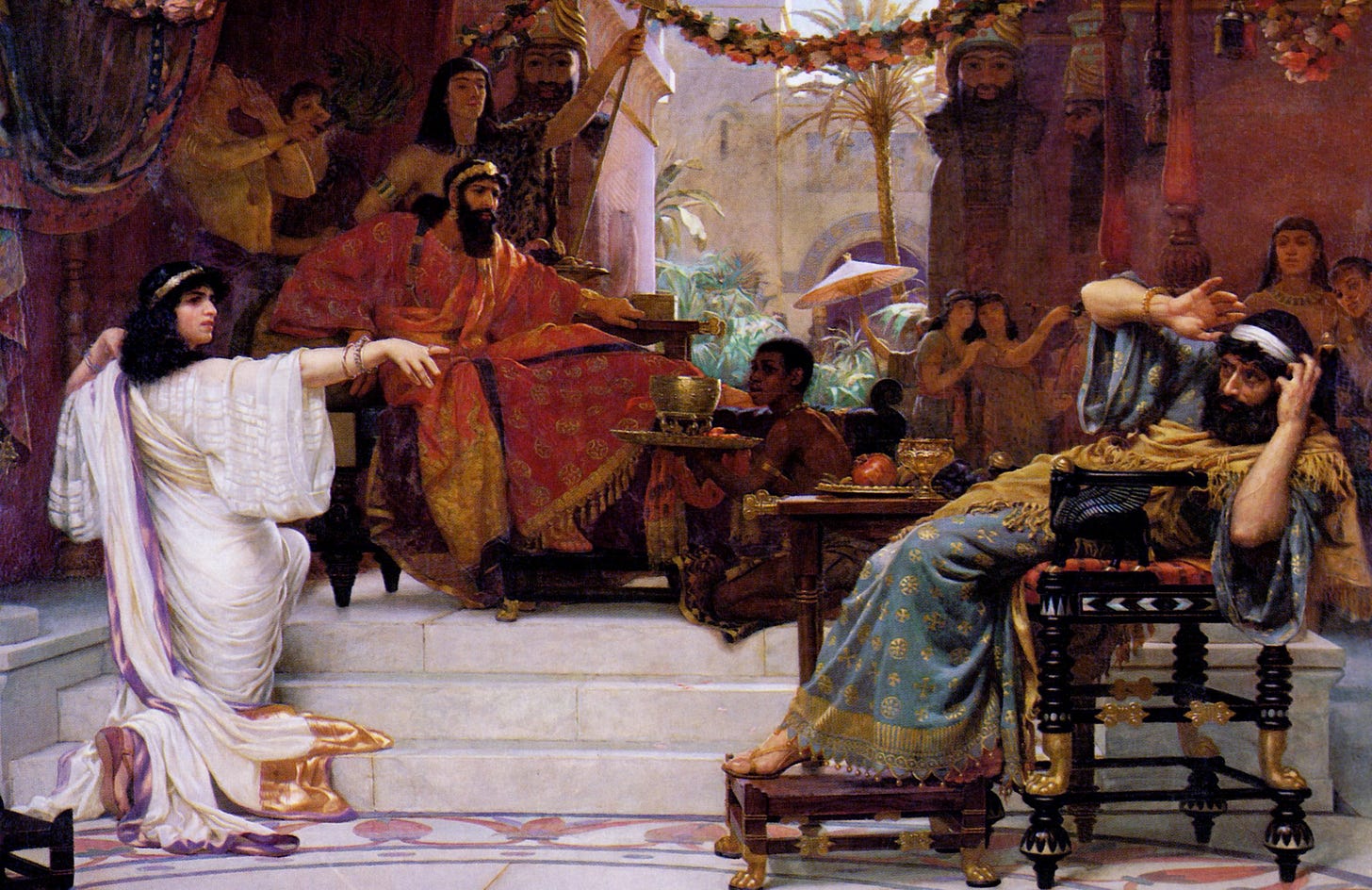
There was a king who lived in a gaudy palace with gold couches and marble pillars and he believed he held absolute control over the women in his life, until he didn’t.
The king was hosting a gala at his estate in Palm Beach — er, I mean ancient Persia — when he ordered his wife Vashti to show off her beauty in front of all his guests. The queen refused, the king got mad, and he publicly shunned her so that all the women in his kingdom would know to obey their husbands.
At the advice of his cronies, the king held a beauty pageant to pick a new wife. In the end he chose Esther, a young Jewish woman living in exile, who had to conceal her ancestry to stay safe in his palace.
Esther lived comfortably as the queen for a while, until one of the king’s advisors got mad at Esther’s cousin Mordecai and devised a plan to kill all the Jews.
It was at this decisive moment that Mordecai sent a message to Esther:
Do not think to yourself that in the king's palace you will escape any more than all the other Jews. For if you keep silent at this time, relief and deliverance will rise for the Jews from another place, but you and your father's house will perish. And who knows whether you have not come to the kingdom for such a time as this?
“For such a time as this.” Fast-forward a few thousand years and this phrase from the Book of Esther is ubiquitous in United States evangelical church culture, nearly always taken out of context.
The Christian Broadcasting Network keeps deploying the Esther story to lionize U.S. President Donald Trump, of all people. They made the comparison explicit in March, when U.S. Secretary of State Mike Pompeo visited Israel during Purim, a holiday commemorating the Jewish people’s deliverance from the Persians by God and Queen Esther.
“Could it be that President Trump right now has been sort of raised for such a time as this, just like Queen Esther, to help save the Jewish people from the Iranian menace?” asked CBN’s Chris Mitchell.
"As a Christian, I certainly believe that's possible," Pompeo said.
The Esther line came up yet again this week when CBN aired an interview with former UN ambassador and South Carolina governor Nikki Haley.
After a narrator described Haley’s fealty to Trump’s agenda, CBN’s David Brody lobbed her this question:
“Is he there for such a time as this? What is your view, kind of spiritually, on the sovereignty of God and what he’s doing exactly by putting Donald Trump as president of the United States?”


I can’t speak to the biblical literacy of producers on the Christian Broadcasting Network, but come on.
If you’re going to drop an Esther reference, you need the self-awareness to realize that Trump is more like the king in that story — gaudy home decor, beauty pageants, sexual conquests, and all — while the character of Esther might more closely resemble one of Trump’s wives, or one of the migrant women in the crosshairs of Trump’s openly racist immigration policy advisor Stephen Miller.
Anybody who grew up in a church with a serious Bible study knows that phrase from Esther. Certainly the target audience got the reference. This interview was recorded during Haley’s visit to Liberty University, one of the world’s largest Christian colleges, where the interviewer practically begged her to run for president in 2024.
Haley’s response to the Trump question was a mishmash of feel-good aphorism and ex post facto rationalization.
NIKKI HALEY: Well, you know, I think it goes to show that things — everything happens for a reason. And so I think that God sometimes places people for lessons and sometimes places people for change, and you can look at everything that’s happened, and I think we’re seeing a lot of change and we’re gaining a lot of lessons from it as well.
It was one of a thousand daily abuses of Christian doctrine that smack American Christians in the face with their sheer brazenness. And that cliche, “everything happens for a reason,” rang all the more insipid as it came on the heels of a segment about the 2015 Emanuel AME Church massacre.
Anybody who was willing to swallow CBN’s bilge this week had already swallowed enough lies to last a lifetime. It would be easy to dismiss CBN’s producers, and Haley, as fools.
Only they aren’t stupid. They are earning their seats at the king’s table.
***
The image at the top is a detail from Edwin Long’s 1878 painting Queen Esther.
The image below is Ernest Normand’s 1888 painting Esther Denouncing Haman.



